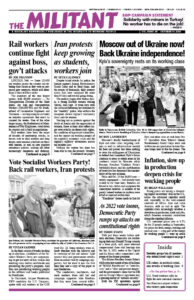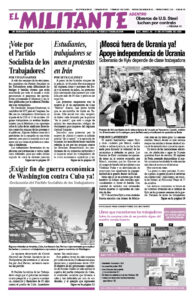LONDON — Just 40 days after taking office, Prime Minister Elizabeth Truss faces calls to quit from fellow Conservative Party members, following financial turmoil triggered by her government’s first budget. This heralds further assaults on jobs, wages and pensions, exacerbating the crisis inflicted on working people over many years.
Truss, the fourth Conservative prime minister in six years, had promised to break with the program of her predecessor, Boris Johnson, and implement tax cuts she said would pave the way for economic growth. Her budget presented tax cuts for corporations and individual capitalists, as well as taxes that workers pay, leaving a 70 billion pound ($78.6 billion) hole in the government’s budget. This fueled fears within capitalist circles here and around the world over stoking inflation and the viability of government debt repayments.
Capitalist speculators greeted the budget with a run on the pound and a sell-off of U.K. government bonds, known here as “gilts.” Interest rates shot up as a result. Pension funds faced meltdown. The Bank of England was forced to buy billions of pounds of gilts to prop up the market.
The interest rates rise means that millions of workers and many among the middle class face hikes in mortgage payments. Rising payments for credit card debt and bank overdrafts will follow. Small-business owners face hikes in debt payments, threatening some with bankruptcy.
Workers expressed very different concerns to those of the wealthy propertied owners. Millions are weighing their job security. Already half a million have been pushed out of the labor force since the pandemic.
“The crisis is not new,” Magdalena Maj, a nurse from the Bethnal Green neighborhood here, told the Militant Oct. 4. “Remember the financial crisis in 2008. Just like then, it was all about the banks, financial institutions, credit. But what has happened since? It’s working people who have suffered.”
Real wages have declined at the sharpest rate on record and employers have imposed brutal shift patterns and other attacks on working conditions. The National Health Service is facing “complete collapse,” according to the doctors’ GP Online, with waiting lists for elective surgery topping 7 million.
With declining confidence in her government and fearing moves to oust her by rival Conservatives, Truss reversed course.
She fired Chancellor of the Exchequer Kwasi Kwarteng Oct. 14, replacing him with Jeremy Hunt, who ripped up the budget and announced tax raises and cuts to public spending.
“Whatever the government does, it will not be good for working people,” Ariful Chowdry, a biomedical student in London, told the Militant. “They save the banks, but those most in need go to the wall.” His mother, Shamima Ahmed, pointed to something else that is changing. “What’s good is that many workers are going on strike,” she said.
Hundreds of thousands of workers — among them rail workers, bus drivers, refuse collectors — have taken strike action to protect wages and job conditions. “Strikers need our support,” Ahmed said.
Bosses at Royal Mail, where 115,000 postal workers, members of the Communication Workers Union, are engaged in a campaign of work stoppages, have announced 10,000 job cuts and plans to scrap the current redundancy scheme. The industrial action is against a paltry 2% wage raise, cuts to sick pay, opposition to mandatory Sunday work and other changes to work conditions.
Weakness of UK capitalist rulers
Truss complained that the bond and currency speculators’ response to her now-scrapped budget was “unfair” because the U.K.’s debt-to-gross-domestic-product ratio was low compared to many rival capitalist powers. Business Secretary Jacob Rees-Mogg blamed the Bank of England, saying it should have raised interest rates earlier and more aggressively. The pound had declined 17% against the dollar before Kwarteng’s budget.
But their complaints mask the special vulnerability of the U.K. rulers’ capitalist economy. In a world facing stagflation, the U.K. is the most “stagflated” among the G-7 nations, with retail price inflation at over 12%, and per capita economic growth averaging under 1% annually since 2000.
Investment in capacity-expanding plant and equipment trails that of rivals. And capitalist profit rates have been squeezed in the U.K. for decades. Today, trading in British pounds accounts for just 5% of world trade.
The biggest expenditure in the now-scrapped budget was a plan to cap energy prices. Truss and Kwarteng had feared workers’ reaction to a previously planned huge price hike. For this worker-correspondent, this would have meant a more than threefold increase in gas and electric bills to nearly six thousand pounds annually.
A government cap on energy prices is backed by all capitalist parties — Conservative, Labour, Liberal Democrat, and the Scottish National Party. Chancellor Hunt now says it will last only until April 2023.
According to polls, Conservatives, the go-to party of the ruling class for a century, face an electoral wipe out. In September Labour Party leader Keir Starmer said tax cuts for the rich were “hugely divisive” in response to Kwarteng’s budget.
Starmer presents Labour as the party of capitalist economic and political stability, saying Truss has “driven the economy into a wall” and is “trashing our institutions.” John Allan, boss of the U.K.’s largest retailer, Tesco, says a recession is likely and Labour is the only party with a plan to grow the economy.
None of the capitalist political options on offer — a weakened Truss, a new Conservative prime minister, a Labour Party government — will do anything to protect workers from the rulers’ drive to put the crisis of their system on our backs. Nor will they turn around the fortunes of British capitalism. Continued attacks on working-class living standards and political instability are guaranteed, posing the need for workers to organize independently of the bosses, build and strengthen our unions, and forge our own party.

